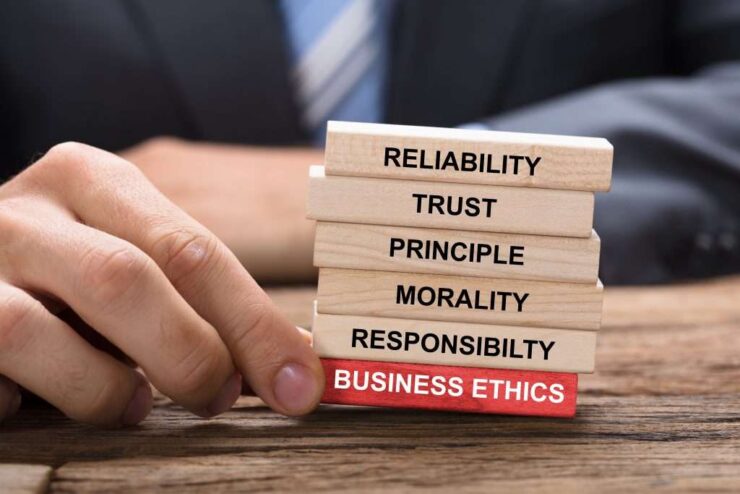Today, companies understand that investors and customers are looking for ethically responsible businesses. As a result, many businesses are engaging in a marketing strategy where they claim to be sustainable, ethical, and eco-friendly when in reality, they are not. But how do you navigate such tricks?
As a consumer or investor, you want to make a difference by promoting sustainability through your businesses. If you are wondering how a company can be ethical, these 5 tips will help you check whether they are ethically responsible. Keep reading!
Page Contents
What Is An Ethical Business?

An ethical business operates on a set of moral principles that guides its conduct. The principles govern every aspect of its operations and how it treats its employees, peers, the public, and customers.
Business ethics ensures companies operate as per the applicable laws, enabling them to maintain optimum respect among their customers and peers and protect them from legal liabilities. An ethical business also builds employee loyalty, increases employee retention, and reduces recruitment, hiring, and training costs.
How To Know A Company Is Ethical
Keeping in mind that sustainability has become a selling point for consumers, brands have taken strict measures to ensure they are more sustainable and ethical than ever. These five major moves display their commitment to operating ethically and upholding sustainability for the good of the people and environment.
1. Core Value Statement

The core value statement entails the values a company operates under. It describes its mission and communicates the objectives the business is willing to live by. Unfortunately, most businesses operate under the survival of the fittest, where values and ethics do not matter, and don’t know how a company can be ethical.
But that thought is misguided and leads to business downfall. For instance, dealing with customers unethically means losing them to competitors, as no one wants to feel unworthy and unappreciated. On the other hand, investors will look for another brand to take their money if they feel your business contributes negatively toward humanity and the environment.
At the same time, employees will leave your business if they are not treated with dignity. Today more than ever, people are looking for businesses with value. A business that is ready to institute a code of conduct for every employee to follow as they carry out the company’s mission is ethical. These principles seek to protect others above the company’s self-interests. Some of the values embedded in the company’s mission should include fairness, integrity, leadership, kindness, loyalty, accountability, and teamwork.
2. Ethical Certification
Another way to determine how a company can be ethical is through third-party certification. Through these bodies, customers, employees, and investors can determine the company’s overall sustainability and the policies and procedures that guide it. Several companies offer certification and make their judgment based on a company’s ability to operate under ethical practices.
Ethical certification also ensures a company’s mission revolves around its social responsibility, not just its reputation. Companies must first verify the legitimacy of their environmental, social, and economic conscious practices are trustworthy and reliable. Today, companies are under pressure from society and investors to report their social responsibility practices. As a result, many apply for ethical certification, where their sustainable policies are assessed and audited.
3. Company Culture

A business must practice ethical culture when dealing with external and internal factors. Unethical company culture entails a contradiction between words and actions. Company culture strives to eliminate double standards and cultivates trust.
For instance, the managers and supervisors are expected to abide by the rules and policies that the subordinates must adhere to. Despite their rank, each organization’s members should put their role above their interests and adhere to the rules without favor or prejudice. Ethical company culture should also create a working environment where employees take pride in their work and identify with the values and objectives of the business.
Employers should not demand productivity but deny employees the right resources to fulfill their responsibilities. Also, employees should be respected as much as customers are respected. Their rights, such as benefits, annual leave, vacation, medical cover, and a safe working environment, should be upheld.
4. Concern For People And Environment
Businesses should be at the forefront to show concern for anyone or anything impacted by their operations, whether the employees, customers, community or the environment. The top management’s decision should reflect how such steps affect the mentioned people and the environment. For instance, the management should ask themselves how the continuous use of fossil fuels affects the employees, the surrounding community, and the environment.
Once burnt, fossil fuels release heavy metals that contaminate rainwater, affecting the community, greenhouse gasses that lead to climate change, and toxic metals that lead to serious respiratory damage for humans. A sincere commitment by the management should see fossil fuels replaced with green energy and develop and maintain a work culture that promotes environmental protection. They should also develop clear strategies for purchasing high-quality materials and install an environmentally friendly waste management system.
5. Strong, Ethical Leadership

Ethical business culture should start at the very top of the organizational chart. Leaders must choose an ethical path instead of focusing solely on financial success. They should demonstrate thoughtful conduct inside and outside the organization and be motivated by the dignity and rights of others.
They should also ensure ethical values are aligned across the organization, avoid bias, encourage open communication, and accept responsibility, especially when on the wrong. Undoubtedly, solid ethical leadership trickles down to all other departments, ignites a positive work culture, fosters employee and customer loyalty, builds a strong brand image and reputation, and increases productivity.
Business Ethics: Determine Whether A Business Is Operating Sustainably
Keeping in mind that businesses are pretending to be sustainable to attract customers and investors, it takes time to pick ethically upright ones. However, through their core value statement, one can determine if the core values they are willing to abide by are ethical. In addition, those that have an ethical certification show they have been vetted and determined to be operating sustainably.
The company culture, concern for the people and environment, and strong ethical leadership portray an ethical business. So determining how a company can be ethical is simple when you know and follow these tips. Best of luck in your search!

